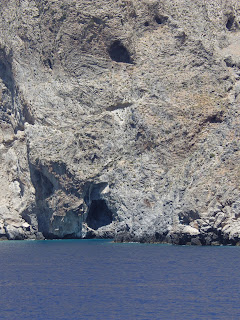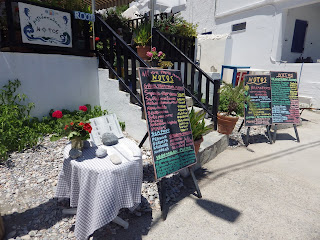Loutro is a little isolated fishing and tourist village on the Libyan Sea, about an hour's drive across the White Mountains and a 20 minute trip by ferry from Chora Sfakia.
The following block of pictures are from
Chora Sfakia.


The following block of pictures are from
Chora Sfakia.





 Anyone familiar with the Battle for Crete know that the British army had many "Dunkirks" in 1940-41.The Germans were pushing them hard everywhere.
Anyone familiar with the Battle for Crete know that the British army had many "Dunkirks" in 1940-41.The Germans were pushing them hard everywhere.On Crete the British had the first real opportunity to stop the Germans but the British were still working on old leadership ideas that were not good for war.
Incompetence at the top led to gross failure to prevent an invasion they knew was coming and had the resources to stop. The British retreat, together with the ANZACs [Australian and New Zealand forces], ended at Sfakia where most were rescued by Australian and British naval vessels.
These monuments commemorate their lives- those rescued and the 1000's who died.
The Cretans on the south end of Crete value their unique "tough" nature. Feuds still happen here.
This canon points to a dock where, last spring, 2 taxi drivers got into a fight over a pickup. One pulled a gun. Others got into it. Dozens of shots were fired. 4 were injured including the 2 taxi drivers. The police said "oh well- Sfakians".
While a little unusual the event is simply another example of life in Sfakia.

The following are ferry pictures between Sfakia and Loutro.


yes- it is this blue here!

Crete is largely limestone and so extensive caves and cave systems are everywhere


Loutro is peaceful. It is small. It feels like a village even though 95% of the people here in the summer are visitors.
It takes less than five minutes to walk from one side of Loutro to the other. It is composed of hotels, tavernas, mini-markets, the "Blue Houses", the pebble beach, a church and a few other buildings - that's it!




Loutro is somewhat unique. The blue white style of houses, most common in the Cyclades Island group but also found along parts of the south coast of Crete, contrast brilliantly with the steep, harsh, rock mountainsides, audibly decorated with the clinking of goat bells.





As the sun moves across the sky the mountains visibly change the panorama in view as its ark lights different aspects of the slopes forming the bowl. The bay is warm and sheltered. This is a magic place.


Small, stunningly beautiful with a conscious decision to offer no nightlife or discos this is a peaceful place. It his composed multinationals staying in its closely grouped buildings.
 During the day, even when all rooms are full, Loutro can feel almost empty - many have gone for a hike along the ocean side trails to private beaches and to sauté in the sun, read the summer stack of books, strolls, walks or try to meet the challenge of some serious hikes up the mountains.
During the day, even when all rooms are full, Loutro can feel almost empty - many have gone for a hike along the ocean side trails to private beaches and to sauté in the sun, read the summer stack of books, strolls, walks or try to meet the challenge of some serious hikes up the mountains. 

The ruins of the old Venetian fortifications litter the old hillside with walls, mostly collapsed houses and numerous other structure.


One can relax and gaze at the Libyan sea from the ruins on the hilltop, watch the ferries that ply the coastal waters regularly come and go. decide whether to read a few pages more or walk over the hill to one of the out lying tavernas or plot a route to Anopolis a thousand metres above...it's up to you. Time passes.



Loutro village was named for the baths (Loutro or Loutra) found in the area, and from which water was directed to nearby Anopoli Village.


Loutro also served as the port of ancient Anopoli. Later it became the winter time port of the town of Sfakia, due to the fact that the enclosed bay and the small island at its entrance create a natural harbor where ships can be safe even in very bad weather conditions.
Mountains rear straight up from the sea with deeply wooded gorges, ravines and valleys. They naturally attract your eye.
The Sfakia region has been the site of heroic deeds, ancient civilizations, and constant intrigue for thousands of years, and the home of brave tough people, made so by their hard life on the land and their experiences of the sea.

And finally there is the sea- warm and clear. The fish are abundant swimming in schools of radiant colours.
The swimming is wonderful. Loutro is an oasis of peace.













No comments:
Post a Comment
Thank you for reading my blog. I look forward to reading your comments.